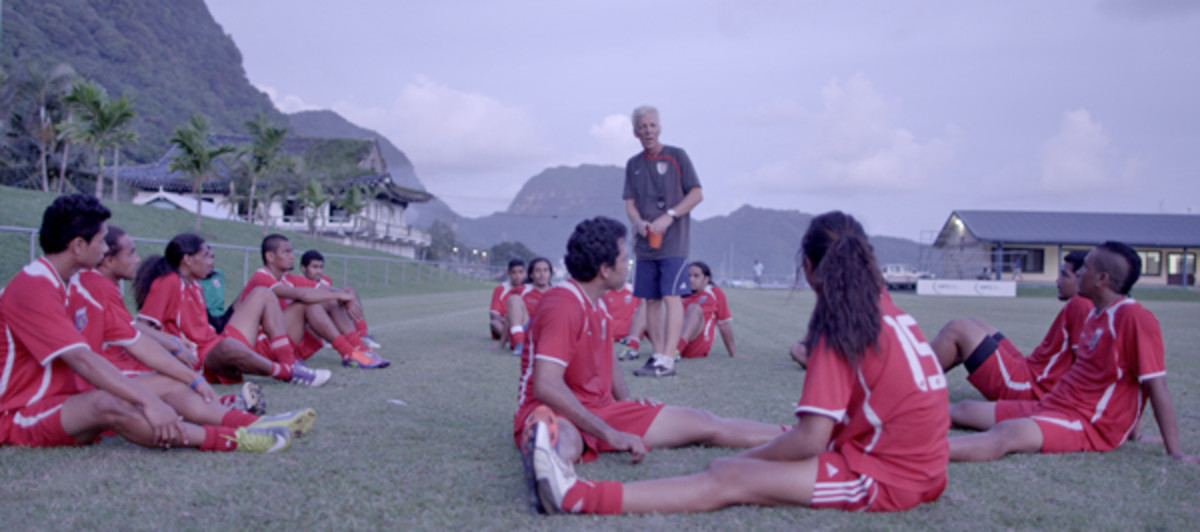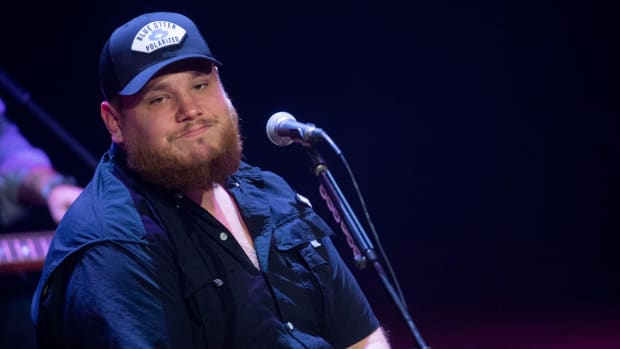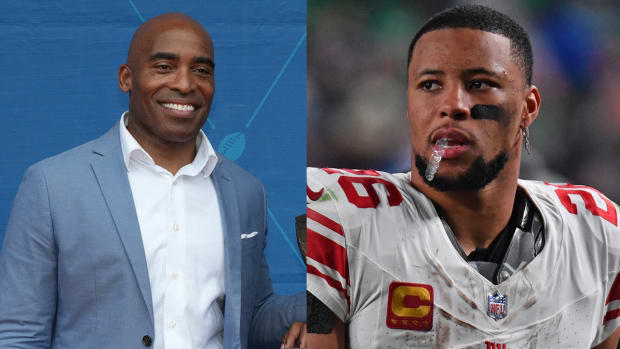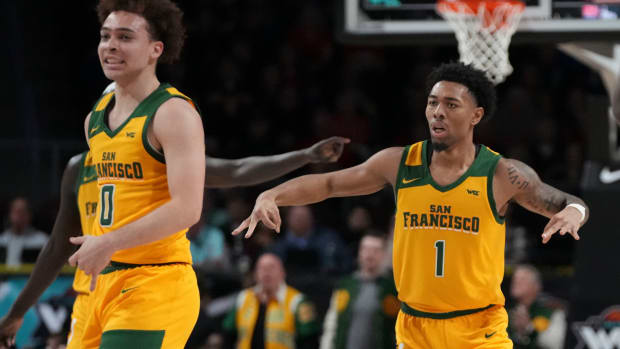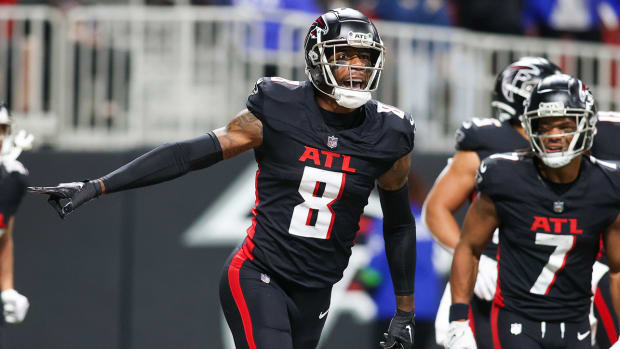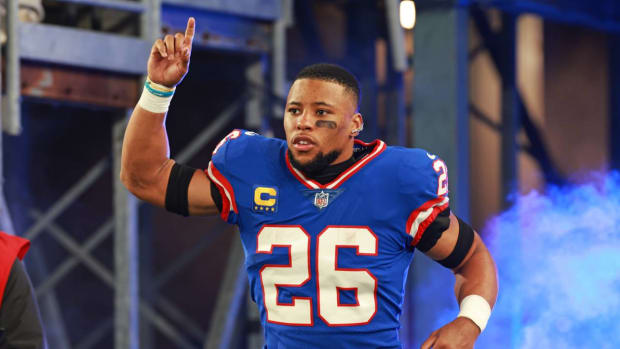EM's Tribeca Awards: Our Favorite Sports Movies at the Tribeca Film Festival
AS ESPN Films executive producer Connor Schell and writer, director and producer Peter Berg discussed during a panel at last month’s Tribeca Film Festival, sports stories in film (spoiler alert!) aren’t really about sports. Berg, who directed the movie Friday Night Lights and was an executive producer of the TV show, says he is constantly stopped by fans touched by the franchise. “Why do these things work?" Berg asked. "It has very little to do with sport. It’s pretty profound — people will come up to you and say, ‘This show saved my marriage.’ Or, ‘We finally figured out how to talk to our daughter about sex or drugs.' Schools were using it to talk about racism. They were showing it at Ivy League colleges in sociology classes.” With that in mind, here are our awards for the best sports movies (that aren’t really about sports) at Tribeca this year.
Best Underdog Tale: Next Goal Wins
Steve Jamison
NEXT GOAL WINS, a documentary directed by Mike Brett and Steve Jamison, tells the tale of the American Samoa national soccer team, perhaps the most underdog squad the world has ever seen in any sport, ever. With the dubious distinction of having suffered the worst defeat in FIFA history in a 31-0 loss to Australia in 2001, the team hadn’t won a game in 17 years when former U.S. Men’s U-20 coach and Ajax superstar Thomas Rongen came to the South Pacific island to help the perennial losers during their run up to the 2014 World Cup qualifiers. But the players have something to teach the savvy soccer coach, too, and by the end, it’s hard to tell what is sweeter — the team’s pure love of a game that hasn’t loved them back for a long time, or the sound of the ball in the back of the net when they score their first goal in years.–A.F.
Best Ragtag Success Story: The Portland Mavericks in The Battered Bastards of Baseball
EM's Tribeca Awards: Our Favorite Sports Movies at the Tribeca Film Festival
AFTER ELEVEN seasons playing Deputy Clem on Bonanza, actor Bing Russell left Hollywood for Portland, Ore. hoping to shift his taste for dramatics from acting to baseball. In 1972 Portland’s Triple A team was relocated to Spokane, and that’s when Bing pounced. Enter the country’s only indie team, the A-level Portland Mavericks. With a roster assembled from a 300-man field of dreamers who responded to a Sporting News classified ad—and Bing’s son Kurt (yes, thatKurt Russell)—the team mimicked its colorful owner, a guy who encouraged on-field antics, like the time he praised the batboy -- the batboy -- for getting thrown out of the game. Who could have guessed that the squad's first ever game would be a 4–0 shutout win. Or that they would go on to regularly top Minor League attendance records. Or post the third-best winning percentage in the country across all leagues in 1977 (.667). The filmmakers Maclain and Chapman Way also happen to be Bing’s grandsons, and it’s clear that they adored the man who the former described as “never far from his drink or his cigar.”
Best Fanboy Director: Michael Rapaport in When the Garden Was Eden
L to R: Jerry Lucas, Walt Frazier, Willis Reed, Phil Jackson & Bill Bradley in 1973
THIS LOVE letter to the 70s-era Knicks earns its laughs in a couple ways: with archival shots of the players' sartorial choices ("Clyde" Frazier in mink, Phil Jackson's overalls) and its idiosyncrasies (Jerry Lucas and Bill Bradley'ssecret language). And then there was the pervasive presence of filmmaker Michael Rapaport himself. Easily identified by his distinctive New York City inflection, Rapaport’s off-camera interjections during his sit-downs sound more like a maniacal fan yelling at the TV than they do a seasoned documentarian. Like the time he cries "Are you f***ing serious?!" after one player says he was paid so little he had to hold down a second job. But even if the director's blatant biases sound more grating than they do endearing, it's worth seeing the film solely to relive Willis Reed's miracle Game 7 return of the 1970 Finals. Guffaws and goosebumps — what's not to love? -R.S.
Best dialogue: Glass Chin
[vimeo 91817708 w=600 h=338]
A DARK morality play with one-two punch one-liners that come at you like left hooks— fast, furious, out of nowhere, and always landing on their mark—Glass Chin is a narrative tour de force by writer/director Noah Buschel about a soft-in-the middle retired boxer, Bud “The Saint” Gordon (Corey Stoll), whose desperation to regain his former glory lands him in a sort of purgatory where he must choose between good and evil. Living in present-day Jersey with his nose pressed up against the sparkling necklace of the New York City skyline and everything he used to be, Bud is helping to train a promising up-and-coming fighter with the squeaky-clean name of Kid Sunshine. When he gets a chance to open up a New York City location of his failed Jersey restaurant, Bud ignores his better angels and his no-nonsense girlfriend (Marin Ireland) for the bright-lights-big-city business seductions of sharkskin suit-wearing restaurateur/gallerist/bookie/drug kingpin and all-around-bad-guy, J.J. Cook, played with gleeful sociopathic flourish by Billy Crudup. As J.J.’s unpredictable pitbull of a hit-man, Roberto, (played to scene-stealing perfection by Yul Vazquez) warns Bud, “J.J. is interested in money, but he’s more interested in people. And owning them...He loves owning people, J.J. Hangs over their life, cloud style. Like the f***ing Wu Tang Clan.” When that prophecy comes true and Bud’s two worlds collide — J.J.’s shadowy one and Kid Sunshine’s bright one—the ex-champ longs for the ordinary life he once disdained.–A.F.
Best Pro Athletes Who Don’t Wear Jerseys: The dancers of Ballet 422
Courtesy of Ballet 422/New York City Ballet
LATE NIGHTS spent studying film and diagramming x's and o's, training montages of lithe bodies jumping rope and doing crunches, cringe-inducing shots of battered toes getting taped, all overlaid by a massive team effort, Ballet 422, (directed by Jody Lee Lipes) has all the hallmarks of a classic sports documentary, give or take a few pairs of tights. Except ballet isn’t a game — it can’t be won or lost. There’s no red zone, two-minute drills or buzzer beaters in artistic dance. But that doesn’t mean there isn’t drama. The real action happens backstage and in the rehearsal studios in the months before a new ballet debuts, and like any good sports doc, Ballet 422 takes the viewer behind the scenes to show all the sweat equity that goes into the magic trick of making feats of intense athleticism on stage look effortless. As producer Anna Rose Holmer said after the film’s final screening at Tribeca, “Ballet dancers are professional athletes, they’re just not paid like professional athletes.”–A.F.
Best non-sports related reason to get up off of that thing: Alex Gibney's as-yet untitled James Brown documentary.
Alex Gibney
not to be reviewed
James Brown
Gorgeous George
-R.S.
